Animal communicators take the mystery
out of conversing with other species
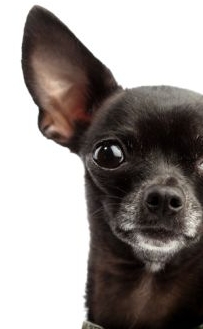
It’s a topic that will fascinate or repulse, depending on how you view the animal companions in your life. Fact is, you can’t even consider talking to other creatures without accepting that they might have emotions, thoughts—minds like ours. Animal communicators go so far as to say that animals have souls, which reincarnate. Such ideas, being completely out of synch with scientific rationality, can be entertained only by people who do not have a strict orthodox faith in science as the source of final answers.
The frustration that many people feel with the idea of animal communication is similar to that felt with religion, which also falls outside what is rational. It is not observable or measurable, and most communicators cannot explain just what they do. For every pet owner who swears by the results, there is another who got no help from it at all.
Animal communication as a profession burst onto the scene in 1971, when Penelope Smith published her book Animal Talk. Smith believes people can be taught to communicate telepathically with other species, and she has trained hundreds of people in her techniques. Over the last four decades, many hundreds of people have become animal communicators on one scale or another, and it is fair to say there are as many styles and methods today as there are yoga teachers. Not all are equally adept, of course. But the most successful clearly have helped a large number of people, because as Abraham Lincoln famously said, you cannot fool all of the people all of the time.
Smith herself is fond of pointing out that communication across species is hardly a new idea. Contact with animal spirits anchors most Native and animist religions, and lingers in such contemporary figures as St. Francis of Assisi and St. Martin de Porres. Animal communicators often claim that humans are born telepathic, but once they learn speech, all other forms of communication are discounted. Yet we all practice telepathy to some degree whenever we “hear” something that has not been said.
Probably the biggest obstacle for skeptics to accept is the common practice of conversing across a distance, without ever meeting an animal. Another common practice that flies in the face of conventional reality is relying on a “spirit guide,” or angelic being, to act as an intermediary or translator. Nothing in our shared physical universe corresponds to these ideas, so they come across as simply wacky.
Still, the practice of animal communication continues to grow. Our increasing attachment to our companion animals, and the desire to reach them, leads many people to try extra-rational means when scientific behaviorism falls short. For that reason, The Bosque Beast thought it might be interesting to hear what some local animal communicators have to say. Whether you are a believer or not, the clear limitations of scientific explanations for animal behavior may open you to the possibility of an intriguing alternative view.

KAREN WATERS worked at the Santa Fe Animal Shelter and Olive Branch Animal Hospital until retiring recently to focus on her artwork. A Reiki master, she communicated with pets as an extension of her healing work. Commenting on a long interview she did with KOAT -TV in July 2008, she explained that animal communication is “the ability to converse between different species using a universal language of telepathic means.” She told news anchor Natalie Swaby that animals communicate to her in “pictures, words, physical sensations like where it hurts.” But she does not “read minds” and can only tell people “what their animals can, or want to tell me.”
Waters’ practice involved contacting pets on her own before relaying to clients what she had learned. “It’s easier to create a link,” she told us. “Animals might be distrustful. They do sometimes find it strange that humans can be telepathic.”
Were you born with this ability, or taught? It started quite unexpectedly. Someone brought an old cat in, and I asked if I could do Reiki on her. I ended up hearing the cat asking what was going on. I completely freaked—I didn’t even want to tell anyone. I knew for certain that this had happened, and I had heard of animal communication, but... My memory of it is that it was a “knowing,” but I do get words, full sentences, images, entire movies of what happened to them.
This was my initiation; it was words, but it’s hard to say “where” I heard. I call it listening through your heart. I’d had an incident before, with dead people. I was completely freaked out about that too—didn’t want it. This was soon after I started the Reiki training. I think if I hadn’t had that experience, the whole cat experience would have been like Just Go Away. I went with the flow, but didn’t know what to do with it afterward. I confided in a friend and started researching, and found Penelope Smith. She was probably the first to write a book and teach people how to do it.
Do animals want to help us, or be helped? We’re really helping the people. It’s not that we’re not helping animals, but we’re really helping people understand their animals. Change is the focus, and it works both ways. Animals will change, but they just need to understand that what they’re doing is inappropriate. Especially dogs, because dogs want to please. Cats are more challenging.
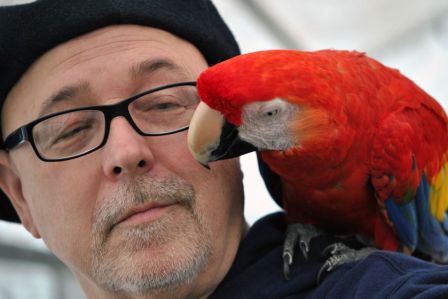
Is the ability to communicate a gift, or can it be taught? I really don’t believe it’s a gift, I’ve taught it to so many people. I have them work with each other’s animals, and they know things they can’t possibly know, so they must be communicating. A few go on to work professionally. Vets take my workshops, which I think is incredibly useful. Also animal shelter people. I believe that anyone is capable of communicating with their animals telepathically. It is something we are born with, but don’t remember how to use. All we need is the willingness to learn.
Can you communicate with wild animals? I have worked with 250 prairie dogs being transferred, and can do it with any animal. But from my perspective it would be like walking up to someone on the street— I usually need a reason (to talk to them). I might convey how beautiful I think an animal is. But I do use it with bugs a lot, because I won’t kill them.
I think it’s really important for people to understand that their animals understand, that (human) thoughts can really shape their animals’ behavior without them realizing it, despite good intentions.

JULIE BROWN is a Reiki Master who founded her Albuquerque practice Windhorse Intuitive in 2008. A horsewoman and artist, she was studying channeling when her own animals began communicating with her. She then incorporated “animal empath” into her menu of services, which includes psychic counseling (“intuitive coaching”) and classes in Reiki and developing intuition.
Like many communicators, Brown works primarily by phone. With a background in channeling, she reaches animals by way of a “spirit guide” rather than directly. She begins by clarifying with the human what the question or problem is, then finds a way to present it so the animal can respond, generally in words or images. On her website, in her blog, and in her work with humans, Brown emphasizes the importance of developing intuition as a form of inner guidance.
Were you born with this ability, or taught? I grew up with animals, so I was probably communicating with them when I was really young. But it’s not something I was very aware of. I got an MFA in visual arts, and when I graduated I felt dead, and decided to move back into my intuitive nature. When you start focusing on your intuition, you realize how much is coming through normally.
What is the difference between understanding animals through observation, and through communication? It’s a different approach. There’s a tendency to look beyond the surface observation. One thing I found when I started working with animals is that it was easier not to be around them. Because I have a lot of associations with body language, it was actually a bit distracting. Observation can bring us all kind of things, but the difference (here) is that you’re tuning in to their spirit, and information that isn’t always obvious.
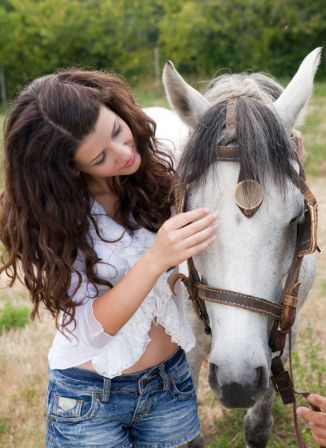
Can intuition lead to communication? If you believe you’re really intuitive, and want to develop a communication with pets, it’s absolutely possible. One thing that gets in the way is our own biases—what we want from them, or for them. That can stand in the way of clear communication.
Do our animals want to help us, or be helped? Animals come to us for their own purposes. There’s usually a healing component to it, but it depends on the animal. I communicate with them on two levels—with their spirit, and with their personality. The two can be quite different. A dog can be quite aggressive in personality, but on the spirit side they could be quite masterful and using that (aggression) as a way to connect with us.
We all have a spiritual nature, which is different from personality. On a spiritual level we may be more enlightened. Are animals conscious of their spirit level? Not necessarily. Does that mean we can’t communicate with them on that level? Not at all. They don’t get quite as involved on the spirit level as on the personality level.
Usually you’re working with people and pets for a particular reason—behavioral or health. Usually you’re trying to get clear on something. A cat that’s peeing on the furniture, for example, on a personality level they could be saying “I do that, I do that, I do that.” When I tap into their spirit, I can work with things, shift things around (to change it).
Does each animal have a unique voice or style? Not the way I usually communicate with animals, which is through my own guide.
Do they communicate with each other? At a higher consciousness, we’re all communicating with each other (all the time). In some ways, animals are probably much more intuitive than humans because they’re more tuned in to the world, more open to vibrational energy. But it’s not like a conversation. This is just my experience. Intuition is a very personal set of guideposts.
Communicating with animals implies that they have minds and souls. Why has this been invisible to scientific understanding? I don’t know—have scientists proved that we have souls? Science is a way of trying to get empirical information and research that will add up. But the soul is not something that’s tangible or measurable, at least at this time. And it still feels like there’s (the influence of) a hierarchy, with humans at the top and animals and plants at the bottom, so we don’t see animals as being as evolved. But “evolution” is a tricky word. Human evolution is also our demise. Animals are different. I don’t think it’s about equality.
Have people in other times and places communicated with animals? Absolutely. I think most people who have animals communicate with them on one level or another—they’re just not that conscious of it. Throughout time, animals have served different purposes, whether domesticating them for work, or for food or companionship. So there’s always been a need for communication to happen. It feels to me like we’re moving into a new time. Technology has brought us so many amazing things, but it’s also distanced us. And there’s a calling for people to move back to nature and be interconnected.
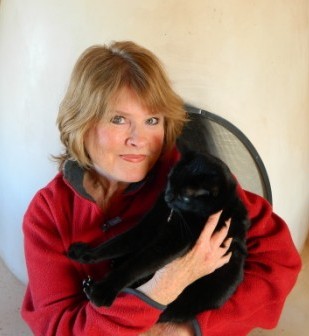
LETA WORTHINGTON, probably the best known animal communicator in New Mexico, studied with Penelope Smith in the 1980s. She is a T-Touch practitioner with a background in herbalism, flower essences, and homeopathy. Her website has links to information from her book How to Talk to Animals, as well as her blog, which explains many of her views.
Since 2008, Worthington has lived on a 40-acre compound in the Galisteo Basin with a menagerie of companions. She serves on the board of the Santa Fe Animal Shelter and continues to paint, teach classes, and talk to animals. In her book, she says animal communication “is, basically, a telepathic exchange or conversation between an animal and a person.... [O]ne does not have to be a psychic to learn how to talk to animals. Anyone can do it if they want to and if they put their mind to it.”
Ethics is an important focus for Worthington in the practice of animal communication. For example, she says entering into conversation with an animal without the owner’s permission is an unethical violation of privacy, because the communicator is usually not in a position to help.
How is communication different from understanding animals through observation? I think it’s kind of both. Behaviorists do deal mostly with observations and general knowledge of a species, and that’s very legitimate. But communication is actually like having a conversation—it’s telepathic, not “psychic” in the sense of being able to tell all kinds of things about them. It’s really a conversation. The way I practice, the questions I ask depend on what a client needs. Usually they have a problem. I like to find out what their needs are so I can shape my questions, because otherwise an animal might not have the same agenda.
Were you born with this ability? Can it be taught? Like a lot of children, I had the ability, but I came across the profession in the mid-’80s when I was at a horse facility in California. I heard about Penelope Smith, called to ask about a horse, and started studying after that. I would compare it to saying some people are more mathematically inclined, and some are more verbal. Some people find it more easy—but they don’t come to class unless they want to learn. If you want to learn, you’re probably set up to be able to learn.
Do you agree with the idea that our animals want to help us? Some of them, absolutely. It depends on the animal and the relationship. I think they have soul connections with us, just like we have with other people. They reincarnate—at least according to what I believe—so they go through a soul evolution, and they’re continually growing and making connections. They come together (just as people do) for different lessons, so we can grow.
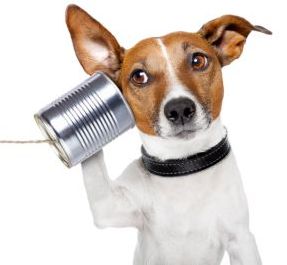
When you talk to animals, do they have unique voices? Usually that’s what I find. Not literally, but you’ll hear a voice quality. Occasionally I’ll talk to a horse who has a real macho cowboy twang, or a little dog whose voice comes across as a cute little voice. I always take those as a means of showing me the nature of their personality. What comes and goes between us is a matter of translation, and I feel there is a band of angelic forces that govern the process and help translate. And sometimes it’s not words, it’s pictures. And then sometimes you get a whole ‘knowing,’ the whole chapter at once. I believe that anytime I get something unique, it’s part of the translation to show me the character or personality.
Do animals want to talk with us? Do they talk with each other? It seems a lot more natural to them than to us. Sometimes they are a little bit hesitant the first time. They rarely ever don’t want to talk.
I doubt they communicate with each other— I’ll have to talk to them about it. Because they don’t use the same language. Horses, dogs, and cats feel very different. A snake or lizard has a different type of metabolism, so they feel very different energetically, and I don’t talk to a lot of them. Talking to wild animals for most of us is a different process. It’s not like tuning in to a unique individual; it can be more of a species-related communication. And along that same train of thought, you can talk to plants, but it’s a different process.
Communicating with animals implies that they have minds. Why is it invisible to scientific observation? I just think that’s a human ego thing. Our species has reached a point where we need to feel superior to everything. I went to Africa a couple of times, and the first thing that struck me when we set down in the bush plane and got into a Jeep to go to camp, the first thing I felt, and it was so deep—you’re really on the food chain over there, and you realize it when you’re out in the bush with all those animals. It’s an odd feeling to realize you’re not in power like we think we are. In our world, we’ve developed to the point where everything has to be proven empirically—it’s ego, fear-based.
Are there societies that do communicate with animals? Yes, Native American and probably all the ancient religions and philosophies have given it a lot more credence and recognition and honor than we tend to. In my book I explain that in shamanic traditions everything has intelligence and meaning— even inanimate objects—and a message or lesson to impart. Being able to tap into intelligence in all its forms is a divine gift we all possess at least to some degree.
Modern-day religions, especially the fundamentalist types, think what I do is of the devil! Yet I think every animal communicator would agree that this work is spiritually based, and that we have help. You can’t fake it. No one’s going to do this if they can’t do it.
